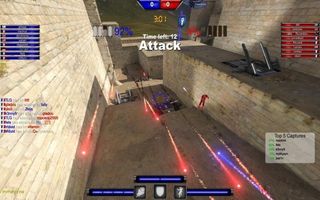ShootMania Storm preview: how Nadeo plan to reinvent the competitive FPS

FPS e-sports have always struggled to reach the same levels of popularity as RTS and MOBAs - something that Nadeo are hoping to change with ShootMania. Designed for competitive play from the ground up, the French developers are aiming to create a new model for the FPS e-sport to suit players and spectators alike.
As with Trackmania, ShootMania will be driven by the community. Maps, skins and even game modes will all be designed, built and tested by players. Not only does this create a pretty much infinite map pool but it also gives players the opportunity to streamline the game into something more fun. If a map or game mode is too one-sided, then it can be tweaked and edited to create a more balanced experience. Most dedicated servers also run a simple map rating system which allows the very best to rise to the top.
The most popular game mode for competitive play is currently 'Elite'. In this 3v3 mode, one attacker wields an instakill railgun where three defenders carry rocket launchers.
But there's a twist. Nadeo have included a block in the map editor that automatically equips a railgun to any defending player standing on the piece. Istead of jumping, space activates a zoom. This enables map makers to create powerful sniper nests for defenders. Similarly, when a player enters a tunnel, their weapon is gets switched to the 'Nucleus' which fires a small glowing blob of mass very slowly. It can stick to walls for a limited time and will detonate when an enemy is within a certain radius. These features put an emphasis on positioning and will separate the professionals from the amateurs.
[VAMS id="44B2n68w464mb"]
But back to the Elite mode. The attacker has three hit points and has to either kill all the defending team or activate the flag by standing on it for one second. However, the flag is only available for capture after 45 seconds have passed, and even then it's only active for a further 15 seconds - so timing is crucial. One of the main problems with watching a competitive FPS is that it's incredibly difficult to keep track of all the players, and as a result most of the action can happen off-screen. This is why Duel is the most popular mode for Quake Live tournaments - you're always going to see every frag when it's just two players battling it out. The sole attacker in ShootMania's Elite mode works in the same way.
Joust is the equivalent of Quake Live's Duel mode. Normally taking place on a small map, both players have limited ammunition with which to hit the opponent a certain number of times. To gather ammo, the player must touch the opponent's flag. It doesn't have quite the same tactical depth as a QL duel, but it can create some very tense moments.
The biggest gaming news, reviews and hardware deals
Keep up to date with the most important stories and the best deals, as picked by the PC Gamer team.
In Royal mode, up to 32 players start in separate spawn locations on the outskirts of a large circular map. Each player has recharging rocket ammo, two hit points, and respawns are disabled. The aim is to be the last player standing. There is also a flag in the center of the map which, once activated, will unleash a giant electrified dome completely enclosing the map. This gradually decreases in size shrinking the battlefield until it's only a few meters wide. Frequently, two players are left dancing around the pole trying to bluff each other into guessing which way they'll go.

Even in the obligatory deathmatch mode, Nadeo have managed to up the stakes by allowing up to 255 players on a single server. Although technically possible, Nadeo international product manager Edouard Beauchemin says that “it is unrealistic to reach such a high number, given the bandwidth required”. I've been playing on an 80 player server throughout the past week and it has surprisingly little lag, given that you can be trying to dodge up to 320 rockets at once. They are still improving the net code throughout the beta - so hopefully higher numbers will be reached with time.
Like TrackMania, Nadeo have developed ShootMania to be incredibly simple to control - just WASD for movement and space for jumping and sprinting. If space is held whilst airborne, you glide and can land much further away than you would normally. Gliding and sprinting both degrade your energy bar, however, which takes several seconds to recharge. The movement system is very fluid, and can even feel a bit like Tribes Ascend when you're gliding across a map.
Competitive Quake Live wasn't just popular for the pixel-perfect aim of its players. Part of the spectacle was the perfectly timed rocket-jumps and plasma wall-jumps that allowed players to circumnavigate entire maps in moments. ShootMania currently has very little leeway for mechanics like this. Although rocket jumping is possible to an extent, there isn't enough benefit gained from doing so. However, ShootMania has only been in beta for a week - and as more and more professional FPS players move over, it's only a matter of time before movement exploits are discovered.
Most Popular

